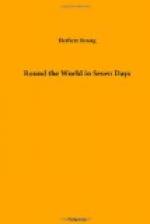“Nearly done, Roddy?” he asked, without turning.
“Pretty near.”
With an outward calmness that corresponded little to his inward sensations Smith lit a cigarette, racking his wits for some means of keeping the pigmies at a distance without provoking a cloud of arrows or a dash in force. The half-circle was gradually becoming narrower. He fancied that their silent movements were checked when he began to smoke, and this suggested to him that an appeal to their curiosity might hold them intent or awestruck until Rodier had finished his task.
“How much longer, Roddy?” he asked quietly.
“Three minutes.”
Smith did the first thing that occurred to him. He took a letter from his pocket, tore it slowly into small pieces, and let the fragments float away on the breeze. This device appeared to be successful for a few seconds; but when the scraps of paper had disappeared or fallen to the ground the pigmies resumed their stealthy silent advance. Smith had another idea. Whistling the merry air of the “Saucy Arethusa,” he took two backward steps towards the aeroplane, seized a half-empty petrol can, and strolled unconcernedly with it to the bank of the stream, which at this point formed a slowly moving pool. As he went he unscrewed the stopper, and on reaching the brink, he poured some of the petrol into the water. Then taking two or three matches from his box, he struck them together, and flung them into the petrol floating on the surface.
The effect of his stratagem was immediate. The spectacle of water apparently on fire was too much for the simple savages. For the first time they broke their silence, and were seen rushing up the wooded slope, uttering shrill cries of alarm. Only then did Smith become aware how numerous they were. The whole forest seemed to be alive with them.
“Done, mister,” cried Rodier.
Smith hurried back to the aeroplane, noticing as he approached several small arrows sticking upright in the ground close to it.




